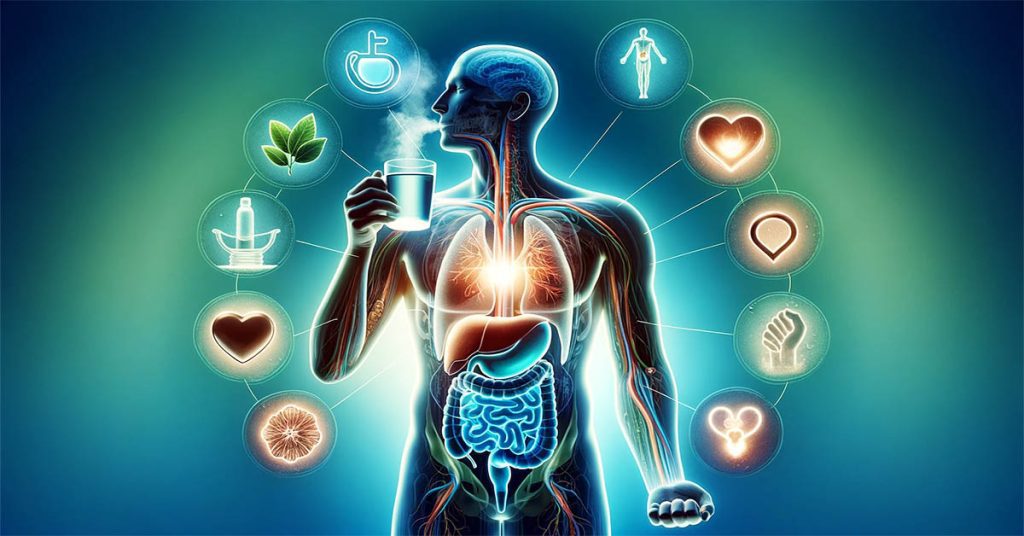In the world of health and wellness, hot water has been hailed as a timeless elixir, believed to offer numerous benefits to our well-being. However, like any other lifestyle choice, it comes with its own set of advantages and disadvantages. In this in-depth guide, we will explore the many pros and cons of drinking hot water, including 12 unexpected benefits of drinking hot water and the side effects of drinking hot water, especially when consumed on an empty stomach. Additionally, we’ll explore the 10 benefits of drinking hot water and how it can have a positive impact on your skin. Join us as we uncover the transformative effects of this simple yet powerful habit and answer the question, “What will happen if I drink hot water every day?“.
The Pros of Drinking Hot Water

1. Detoxification and Cleansing
Starting your day with a warm cup of water can help flush toxins from your body, leaving you feeling refreshed and rejuvenated.
2. Digestive Aid
Hot water can enhance digestion by breaking down food more efficiently and relieving symptoms of indigestion.
3. Weight Management
It boosts metabolism and can help with weight loss when consumed in place of sugary beverages.
4. Pain Relief
Hot water can provide natural relief from various pains, including menstrual cramps and muscle soreness.
5. Improved Blood Circulation
Promotes better blood circulation, leading to healthier skin and overall vitality.
6. Stress Reduction
A warm cup of water has a calming effect, reducing stress and anxiety levels.
7. Respiratory Health
Inhaling steam from hot water can relieve congestion and soothe sore throats.
8. Skin Benefits
Hot water opens pores and cleanses your skin, promoting a clearer complexion.
9. Joint Health
Warm water can ease joint stiffness and improve mobility, particularly beneficial for arthritis sufferers.
10. Better Hydration
It can encourage you to drink more water throughout the day, preventing dehydration.
11. Unexpected Benefits of Drinking Hot Water
Such as improved mood and enhanced hair health, by incorporating hot water into your routine.
The Cons of Drinking Hot Water

1. Risk of Burns
Hot water can scald if not consumed at the right temperature, posing a risk to the mouth and throat.
2. Dehydration
Drinking hot water may lead to dehydration if not balanced with cool water intake, as it can cause increased sweating.
3. Mineral Loss
Extremely hot water might leach minerals like calcium and magnesium from teeth and bones over time.
4. Digestive Discomfort
Not suitable for those with sensitive stomachs, as it can worsen conditions like acid reflux.
5. Seasonal Suitability
Hot water may not be appealing in hot, humid weather, where cooler beverages are more refreshing.
6. Taste Preference
Some individuals prefer the taste of cold water or flavored drinks over hot water.
7. Inconvenience
Preparing hot water may be less convenient than grabbing a cold glass from the fridge.
8. Potential for Bacterial Growth
If hot water is not stored properly, it can promote bacterial growth.
9. Environmental Impact
Constantly heating water can have an environmental footprint due to energy consumption.
10. Cost Considerations
Regularly consuming hot water may lead to higher energy bills, depending on your heating method.
Real Life Stories
To bring these pros and cons to life, let’s explore a couple of real-life stories:
1: Maria’s Morning Ritual
Maria, a 35-year-old office worker, used to start her day with a cup of coffee. After learning about the benefits of hot water, she switched to warm water with lemon. Over time, she noticed improved digestion and clearer skin. Hot water became an essential part of her morning routine, leaving her feeling refreshed and ready to tackle the day.
2: Mark’s Muscle Relief
Mark, a fitness enthusiast, often experienced sore muscles after intense workouts. Instead of relying on pain relievers, he began taking hot showers and drinking hot water with ginger. The soothing warmth helped alleviate his muscle soreness, and he no longer needed over-the-counter remedies.
A Step-by-Step Guide to Incorporating Hot Water into Your Routine
If you’re interested in incorporating hot water into your daily life, follow this simple step-by-step guide:
Step 1: Choose the Right Temperature Start with warm water, not boiling hot, to avoid burns.
Step 2: Add Flavors (Optional) Enhance the taste and benefits of hot water with lemon, ginger, honey, or herbal tea bags.
Step 3: Morning Ritual Consider starting your day with a cup of hot water to kickstart your metabolism and detoxify your body.
Step 4: Remedies Use hot water for natural remedies like sore throat relief or muscle relaxation.
Step 5: Stay Hydrated Remember that hot water should complement, not replace, your overall hydration strategy. Drink plenty of room temperature or cool water throughout the day to stay properly hydrated.
Confidence in Your Choice
In conclusion, drinking hot water can offer a wide range of health benefits, from detoxification and improved digestion to stress reduction and pain relief. However, it’s crucial to be aware of potential drawbacks, such as the risk of burns and dehydration.
The key to harnessing the pros and minimizing the cons of drinking hot water lies in making informed choices that align with your unique needs and circumstances. Whether you decide to enjoy a warm cup of water in the morning or opt for a refreshing glass of cold water, the choice is yours to make with confidence.
Now, go ahead and take that first sip of hot water, and embark on a journey towards a healthier, more balanced life. Cheers to your well-being!
Additionally, incorporating some of the 10 best foods to relieve constipation into your diet can complement the benefits of drinking hot water for digestive health along with Stress And Anxiety Management
Disclaimer: This article is for informational purposes only and should not be considered a substitute for professional medical advice. Always consult with a healthcare provider before making significant changes to your dietary habits or wellness routine.





